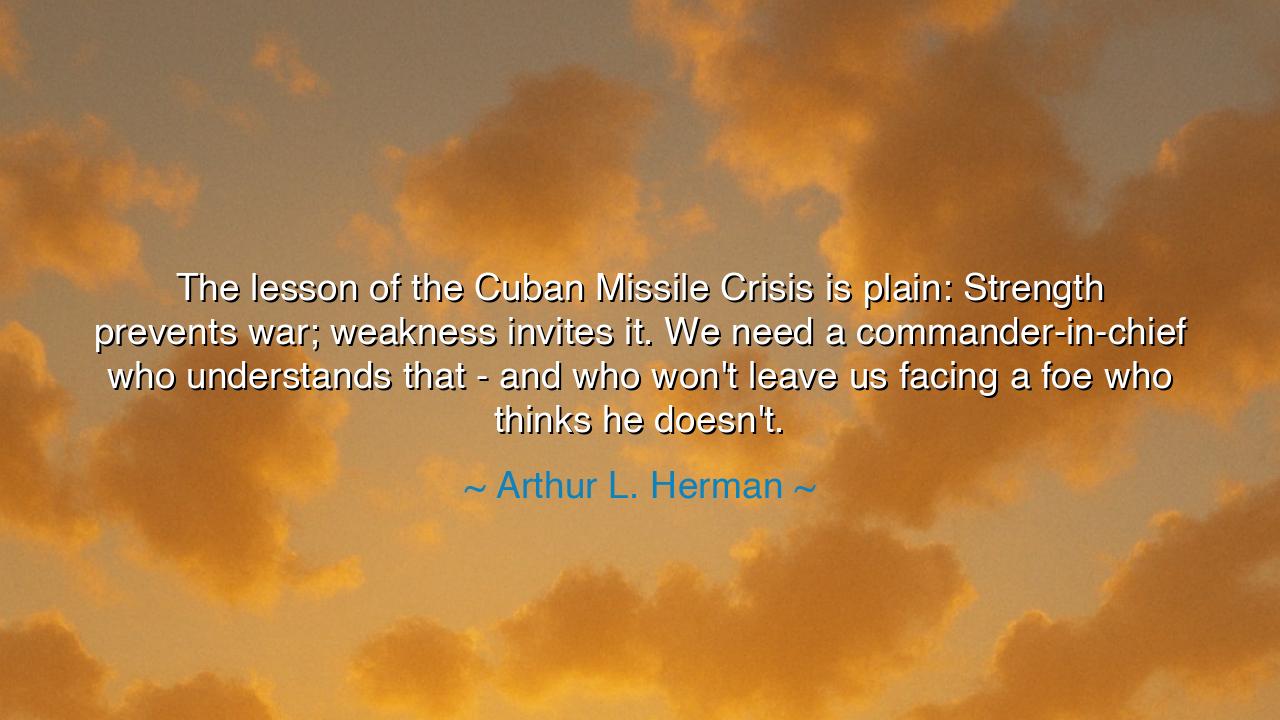
The lesson of the Cuban Missile Crisis is plain: Strength
The lesson of the Cuban Missile Crisis is plain: Strength prevents war; weakness invites it. We need a commander-in-chief who understands that - and who won't leave us facing a foe who thinks he doesn't.






Hear the words of Arthur L. Herman, who, reflecting upon one of the most perilous moments in human history, declared: “The lesson of the Cuban Missile Crisis is plain: Strength prevents war; weakness invites it. We need a commander-in-chief who understands that – and who won’t leave us facing a foe who thinks he doesn’t.” In this statement burns the ancient truth that the balance of peace often rests not in softness, but in the presence of visible resolve. For when nations stare across the abyss of war, it is not silence or frailty that keeps the sword sheathed, but the strength of those who stand firm.
When Herman invokes the Cuban Missile Crisis, he speaks of those fateful days in October 1962 when the world stood on the brink of annihilation. Soviet missiles were placed in Cuba, a mere stone’s throw from American shores. Fear gripped the globe, for one misstep could have meant the unleashing of fire that would have consumed nations. Yet, it was not panic that prevailed—it was the demonstration of will. President John F. Kennedy showed firmness, establishing a naval blockade and making clear that aggression would not be tolerated. It was this resolve, not weakness, that forced the adversary to retreat. Thus the world was spared.
The lesson is eternal: peace is preserved not by yielding to threats, but by showing the courage to resist them. Strength prevents war because it signals to any foe that the cost of aggression will be unbearable. Weakness invites war because it tempts the ambitious to believe they can strike without consequence. This is not merely the way of nations, but of men, communities, and even the spirit itself. When one shows courage, bullies fall back. When one cowers, predators close in.
History gives countless echoes of this truth. Consider the tale of Rome in its decline. When its legions stood mighty, barbarian tribes hesitated to test the empire. But when the empire grew soft, its walls crumbled, and the invaders poured in. Or recall Britain’s lonely stand in 1940, when the voice of Churchill, like a tower of steel, proclaimed that even if the island were invaded, the people would fight on the beaches, the fields, and the streets. That strength of will, though Britain was battered and weary, deterred Hitler from attempting invasion. In both cases, history testifies: weakness feeds the fire of enemies, but strength quenches it before it burns.
Herman’s warning is not only for leaders of nations but for all who bear responsibility. To those entrusted with the defense of others—be it a commander, a parent, or a teacher—the message is clear: you must not falter. If those who depend on you sense weakness, they are left vulnerable. If foes see weakness, they are emboldened. A leader who shows strength builds a wall of protection around their people, not because they desire war, but because their very resolve makes war unnecessary.
The deeper meaning of this truth is that strength is not cruelty, nor is it aggression. It is the shield that guards peace. Kennedy did not hurl his nation into war; he stood so firmly that war was avoided. This is the paradox: the way to prevent war is not by abandoning resolve, but by holding it so strongly that the enemy dares not strike. Strength, rightly held, is mercy in disguise, for it protects life without spilling it.
The lesson for us, O listener, is this: cultivate strength in your own life, so that you are never easy prey to forces that would harm you or those you love. In the face of adversity, do not signal weakness, but steadiness. In your community, in your family, and in your nation, demand leaders who understand that peace rests not on frailty, but on firmness. And in your heart, remember always that true strength is not the lust for battle, but the courage to stand so resolutely that battle never begins.
Thus Herman’s words endure, echoing through the halls of history: “Strength prevents war; weakness invites it.” Let us remember the Cuban Missile Crisis, when the world was spared not by timidity but by courage. Let us carry this truth into our own lives, that we may stand firm, protect those who depend upon us, and preserve peace not by surrender, but by unshakable strength.






AAdministratorAdministrator
Welcome, honored guests. Please leave a comment, we will respond soon